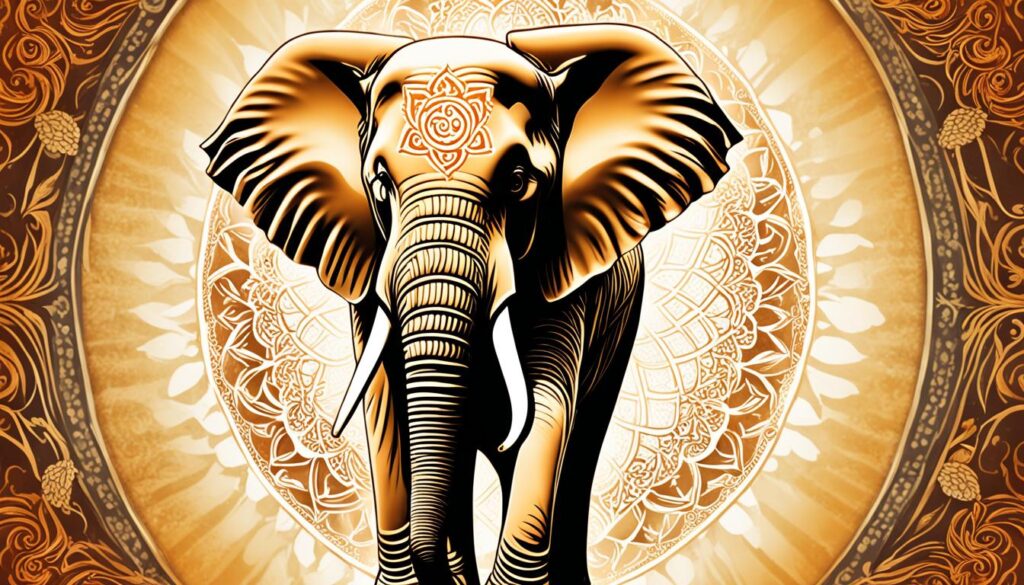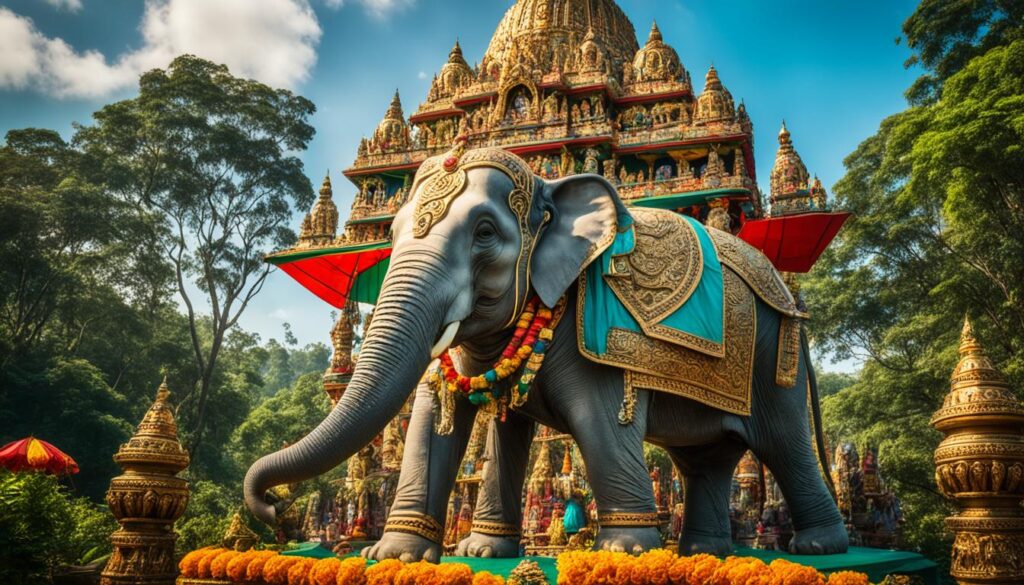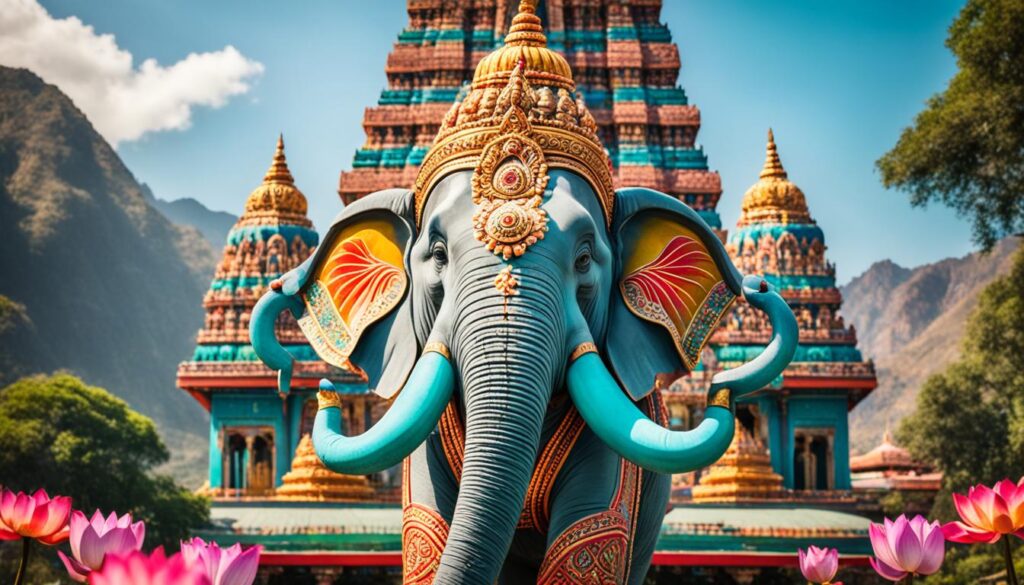Have you ever wondered why elephants hold such significance in Buddhism? Why do these majestic creatures appear in Buddhist teachings, scriptures, and art? The symbolism of elephants in Buddhism goes beyond their physical presence and carries profound spiritual meaning.
Buddhism, one of the world’s major religions, has a rich tapestry of symbols and imagery, and elephants play a prominent role in this narrative. From ancient legends to contemporary interpretations, elephants hold a special place in Buddhist culture, representing qualities and values that align with the teachings of the religion.
Key Takeaways:
- Elephants have significant symbolism in Buddhism, representing various qualities and values.
- They are associated with wisdom, strength, patience, and peace.
- Elephants hold cultural significance in Southeast Asian Buddhist communities as symbols of luck, fortune, and royalty.
- Elephants also have symbolic importance in other Indic religions, such as Hinduism.
- The contemporary relevance of elephant symbolism in Buddhism lies in its guidance on mindfulness, compassion, and addressing life’s challenges.
The Spiritual Significance of Elephants in Buddhism
In Buddhism, elephants hold great spiritual significance and are symbolic of various qualities that align with the teachings of the religion. They represent wisdom, strength, patience, and peace, embodying the ideals that Buddhists aspire to cultivate on their spiritual journey.
The elephant’s association with wisdom stems from its large ears, which symbolize the importance of listening and learning in Buddhist practice. Just as the elephant uses its ears to gather information and gain insight, Buddhists strive to develop wisdom through deep listening and acquiring knowledge.
Furthermore, the elephant’s strength and patience are illustrated through its ability to calmly navigate through life’s challenges. Despite their massive size, elephants move with grace and resilience, demonstrating the significance of inner strength and perseverance in the face of adversity.
Elephants also embody peace and tranquility, as they are known for their gentle nature and harmonious presence. Their calm demeanor serves as a reminder for Buddhists to cultivate inner peace and practice mindfulness in all aspects of life.

Overall, elephants serve as powerful metaphors in Buddhist teachings, reminding practitioners of the qualities they should strive to embody. Their symbolism is not only found in Buddhist texts and teachings but also in intricate sculptures and artwork throughout Buddhist history.
Elephant Symbolism in Buddhist Texts
Elephant symbolism is prevalent in various Buddhist texts, further emphasizing their spiritual significance. In these texts, elephants are often depicted as wise and noble creatures that embody virtues such as compassion, mindfulness, and selflessness.
For example, the Jataka tales, which recount the previous lives of the Buddha, often feature elephants as central characters. These stories highlight the wisdom and moral principles that elephants represent, inspiring Buddhists to embrace similar qualities in their own lives.
Elephant Symbolism in Buddhist Teachings
Within Buddhist teachings, elephants are often used as symbols to impart valuable lessons and guidance. The elephant’s symbolic attributes serve as reminders for practitioners to cultivate wisdom, strength, and patience in their spiritual practice.
By reflecting on the symbolism of elephants, Buddhists are encouraged to approach life’s challenges with resilience and inner strength, understanding that patience and perseverance are integral to personal growth and enlightenment.
The spiritual significance of elephants in Buddhism extends beyond their physical presence, inviting practitioners to explore deeper meaning and insights on their quest for spiritual awakening.
Elephant Symbolism in Southeast Asian Buddhist Culture
In Southeast Asian Buddhist culture, elephants hold great significance and are revered as symbols of luck, fortune, and royalty. These majestic creatures have a profound presence within Buddhist temples and communities, embodying both spiritual and cultural importance.
A prominent aspect of elephant symbolism in Southeast Asia is the use of trained elephants in Buddhist temples. These elephants, known as “temple elephants,” serve as a connection between the human and divine realms, reinforcing the sacred relationship between Buddhists and these revered animals. The temple elephants play a vital role in religious ceremonies and processions, further enhancing the spiritual atmosphere within the temple grounds.

Elephants are considered symbols of luck and fortune, believed to bring blessings and prosperity to those who encounter them. Their gentle demeanor and intelligent nature are seen as auspicious qualities that uplift the spirits of devotees and inspire reverence.
Additionally, white elephants hold a particular significance in the region. In Thailand and Burma, white elephants are viewed as symbols of royalty and are deeply revered. These majestic creatures are associated with power, purity, and divine blessings. Their presence in royal ceremonies and processions further emphasizes their regal symbolism.
The cultural associations between elephants and spirituality highlight the deep-rooted reverence for these animals in Southeast Asian Buddhist communities. Their symbolism represents a deep connection to nature, wisdom, and the divine, fostering a sense of reverence and spiritual connection to the world around them.
Elephant Symbolism in Other Indic Religions
Elephants hold great significance not only in Buddhism but also in other Indic religions, particularly Hinduism. In Hinduism, one of the most worshipped deities is Lord Ganesh, who is depicted with an elephant head. Lord Ganesh is revered as the remover of obstacles and the harbinger of good fortune. His elephant symbolism symbolizes wisdom, intelligence, and strength, making him a beloved figure among Hindus.
Furthermore, the connection between Hinduism and Buddhism can be observed through the shared symbolism of elephants in both religious traditions. The elephant is known as the vehicle of Lord Indra, the king of gods, in Hindu mythology. Similarly, in Buddhism, the white elephant represents purity, compassion, and enlightenment.
This interplay between Hinduism and Buddhism showcases the cultural exchange and influences between these two religions throughout history. The elephant’s symbolism as a powerful and revered creature has transcended religious boundaries, uniting followers of different faiths in their appreciation and reverence for this magnificent animal.
To illustrate the significance of elephants in Hinduism, here is a table highlighting some key aspects:
| Aspect | Description |
|---|---|
| Lord Ganesh | Lord Ganesh, with his elephant head, is worshipped as the remover of obstacles and the lord of new beginnings. |
| Symbol of Wisdom | The elephant symbolizes wisdom, intelligence, and discernment in Hindu mythology. |
| Remover of Obstacles | Elephants are believed to possess the power to eliminate hindrances and ensure smooth progress. |
| Connection with Lord Indra | The elephant is the vehicle of Lord Indra, the king of gods, symbolizing power, strength, and authority. |

The sacred symbolism of elephants in Hinduism serves as a testament to their deep-rooted cultural and spiritual significance. This connection between Hinduism and Buddhism not only highlights the shared values and beliefs but also emphasizes the interconnectedness of various Indic religions.
Contemporary Significance of Elephant Symbolism in Buddhism
Elephant symbolism in Buddhism holds a modern interpretation that remains relevant in today’s world. The qualities associated with elephants, such as mindfulness, compassion, and the ability to address challenges, provide valuable insights for personal growth and societal harmony.
In the practice of mindfulness, elephants serve as a powerful symbol of being fully present in the moment. Just as an elephant moves gracefully and attentively, mindfulness teaches us to cultivate awareness and focus on the present, allowing us to experience life with greater clarity and appreciation.
Compassion, another central value in Buddhism, is beautifully encapsulated in elephant symbolism. Elephants are known for their deep emotional connections and their caring and protective nature toward their herd. By embodying the compassion of elephants, individuals can cultivate empathy, kindness, and a genuine concern for the well-being of others.
Addressing challenges is an integral part of the human experience, and elephant symbolism offers valuable lessons in perseverance and resilience. Elephants are known for their strength and their ability to navigate difficult terrains and overcome obstacles. Drawing inspiration from elephant symbolism, individuals can embrace challenges as opportunities for growth and transformation.
The teachings of Buddhism, encompassing the symbolism of elephants, provide profound guidance and inspiration for individuals seeking enlightenment and wisdom in today’s world. By integrating the qualities of mindfulness, compassion, and addressing challenges, we can embark on a transformative spiritual path that not only benefits our own well-being but also contributes to the greater harmony of our global community.

Conclusion
In conclusion, the symbolism of elephants in Buddhism holds profound spiritual significance. From ancient legends and texts to contemporary interpretations, elephants embody qualities and values that resonate with Buddhist teachings. As symbols of wisdom, strength, patience, and peace, elephants serve as powerful metaphors for the virtues that practitioners strive to cultivate in their spiritual journeys.
Furthermore, the symbolism of elephants extends beyond Buddhism and permeates Southeast Asian cultures, where they are revered as symbols of luck, fortune, and royalty. The association between elephants and Hinduism, particularly through Lord Ganesh as the remover of obstacles, highlights the interconnectedness of these two Indic religions.
More importantly, the symbolic meaning of elephants remains relevant in the modern world. Their representations of mindfulness, compassion, and the ability to navigate challenges offer invaluable guidance for finding harmony within oneself and addressing the complexities of today’s society. Exploring elephant symbolism in Buddhism invites individuals to delve deeper into the profound wisdom and lessons that this ancient tradition offers.
FAQ
What is the significance of elephants in Buddhism?
Elephants are potent symbols in Buddhism and represent qualities such as wisdom, strength, patience, and peace.
How are elephants associated with wisdom in Buddhism?
Elephants’ large ears symbolize the importance of listening and learning, illustrating the connection between elephants and wisdom in Buddhist practice.
Why are elephants considered symbols of strength and patience in Buddhism?
Elephants’ ability to calmly navigate through life’s challenges showcases their strength and patience, which are important qualities in Buddhism.
What is the significance of elephants in Southeast Asian Buddhist culture?
Elephants are revered as symbols of luck, fortune, and royalty in Southeast Asian Buddhist culture. Some temples even keep trained elephants as a way to maintain a connection with this sacred animal.
Why are white elephants considered sacred in Thailand and Burma?
White elephants are seen as symbols of royalty in Thailand and Burma, highlighting their deep-rooted significance and reverence in these countries.
How are elephants connected to Hinduism?
In Hinduism, Lord Ganesh, with his elephant head, is one of the most worshipped deities. The symbolism of elephants is shared between Hinduism and Buddhism, showcasing the interplay between these two religions.
Why is elephant symbolism relevant in modern times?
Elephant symbolism offers important insights for personal and societal harmony, emphasizing qualities such as mindfulness, compassion, and the ability to navigate challenges. These teachings are still applicable and inspiring in today’s world.

